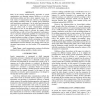Free Online Productivity Tools
i2Speak
i2Symbol
i2OCR
iTex2Img
iWeb2Print
iWeb2Shot
i2Type
iPdf2Split
iPdf2Merge
i2Bopomofo
i2Arabic
i2Style
i2Image
i2PDF
iLatex2Rtf
Sci2ools
ICASSP
2010
IEEE
2010
IEEE
Leveraging evaluation metric-related training criteria for speech summarization
Many of the existing machine-learning approaches to speech summarization cast important sentence selection as a two-class classification problem and have shown empirical success for a wide variety of summarization tasks. However, the imbalanceddata problem sometimes results in a trained speech summarizer with unsatisfactory performance. On the other hand, training the summarizer by improving the associated classification accuracy does not always lead to better summarization evaluation performance. In view of such phenomena, we hence investigate two different training criteria to alleviate the negative effects caused by them, as well as to boost the summarizer’s performance. One is to learn the classification capability of a summarizer on the basis of the pair-wise ordering information of sentences in a training document according to a degree of importance. The other is to train the summarizer by directly maximizing the associated evaluation score. Experimental results on the broadca...
ICASSP 2010 | Signal Processing | Summarization Evaluation Performance | Summarization Task | Trained Speech Summarizer |
| Added | 06 Dec 2010 |
| Updated | 06 Dec 2010 |
| Type | Conference |
| Year | 2010 |
| Where | ICASSP |
| Authors | Shih-Hsiang Lin, Yu-Mei Chang, Jia-Wen Liu, Berlin Chen |
Comments (0)

